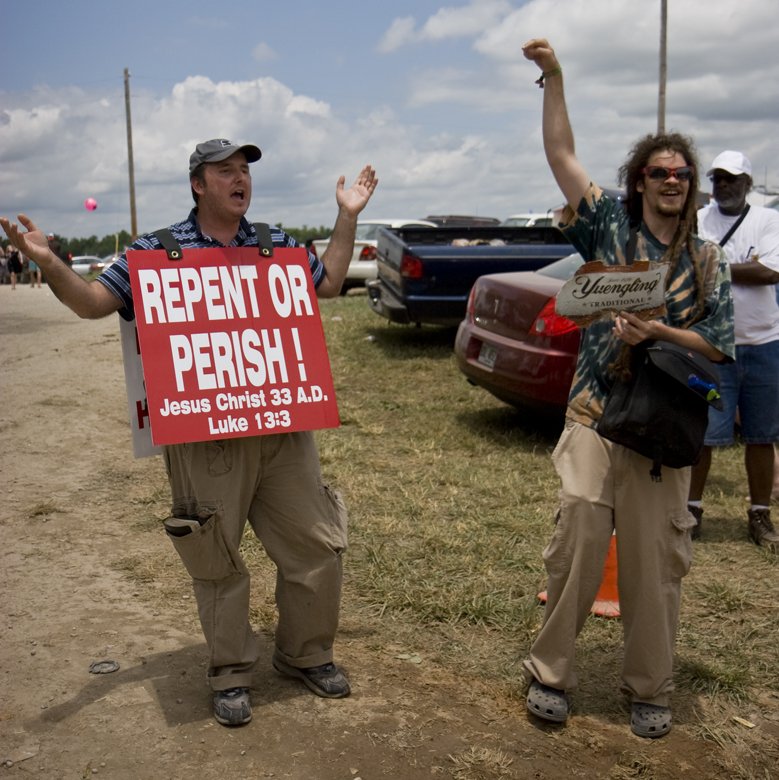D&C 6:9 says: “Say nothing but repentance unto this generation.”
This always struck me as a strange phrase. Really, nothing else? Would that make us like this guy:
I think not.
The first point is that saying nothing but repentance means you must start with yourself. This means that what repentance really means is that you must do this:
Concentrating on your own repentance is the most important thing you can do. True repentance comes from relying on the Savior and considering His atonement.
So, what else does it mean to “say nothing but repentance.” Any thoughts?





Just a couple of items to add to the understanding.
When Jesus said “I am not come to call the righteous, but sinners to repentance” (Matt: 9:13) the word translated to “call” was from a Greek word, kalein, generally used to invite a guest to a home or a meal.
That makes a difference in the tenor of the communication involved.
And repentance in the New Testament is often from another Greek word, metanoeo, that has connotations of profound change of mind and heart and essence.
That makes a difference in understanding of what one is inviting others to.
So one could make a case for this passage as a call to make all of our communication with others the kind of communication that is welcoming, inviting and infused with the change of mind, heart and essence that our repentance and conversion to Christ has brought to our own lives.
Just to continue Mary’s thought, repentance is often what we consider telling bad people to do when they need to stop being bad people.
But repentance also helps good people to become better. I can’t imagine anything in General Conference that isn’t designed to turn us toward God and make us better.
Good comments.
What about Matthew 5:37?:) On the more serious side, preaching repentance is probably the foremost thing we can do. It’s a broad enough topic to encompass inviting others to come unto Christ, keep the commandments, and so forth. It doesn’t have to be judgmental, just an invitation and encouragement to do better.
I think the revelation is meant to evoke the spirit of the early Christian church, as in the first few chapters of Acts. After Christ left, the apostles focused almost entirely on repentance and baptism. Then, after the community was built, deeper doctrinal topics came up, like having all things in common. Milk before meat.
I would be curious to hear what exactly it was that early Mormon missionaries usually preached. Did they emphasize the fact that a modern prophet had arisen? Did they focus on the Book of Mormon as another testament of Christ? Millennialism, the gathering of Israel? Or was their message simple revivalism as the revelation states: repentance and baptism?
I don’t think the same message will work today, at least not for everyone. You can’t tell someone to repent, if they don’t believe they have anything to repent of. The popular concept of sin was different in the 19th century than it is today in the 21st. The call to “repent” is revivalist. You can’t have a revival unless there is something to revive. Today, you often have to build these religious concepts up from scratch first.
On my mission we interpreted preaching repentance as basically teaching anything that will help people turn their hearts to God (i.e. cause them to repent). Which meant the 4 missionary lessons, but more broadly, anything the Spirit tells you to say.
The idea may have even come from Preach My Gospel.
D&C 19 is where the Lord tells Martin Harris to repent or else he will suffer as the Lord did. Then the Lord commands Martin to preach repentence. So the Lord is telling Martin to practice what he preaches.
Another take is that Martin Harris was the first “repent and go” missionary.
But -preaching- repentance is not necessarily the same as -commanding- someone to repent. In addition to an invitation or plea, the preaching of repentance can be the -teaching- of repentance, ie, not only the how, but that repentance is -available-, and that true repentance brings forgiveness.
There may be times when an authorized servant may be inspired to command or warn. As when Joseph spoke to Martin in the Lord’s name. The D&C has other instances where individuals are commanded to repent.
Very good points, Book.